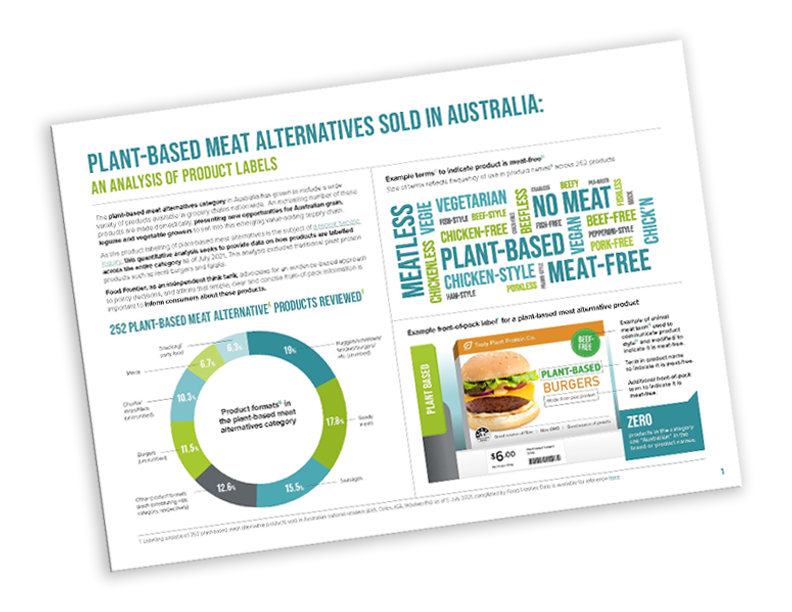Background
Until now, conversation surrounding the current Senate Inquiry into the Definitions of Meat has relied on anecdotal evidence and questionable surveys based on a small number of products that take an uncommon labelling approach.
Food Frontier, as a think tank and data-driven research organisation, has undertaken an in-depth, category-wide analysis of front-of-pack labels across the 250+ plant-based meat alternatives in Australian supermarkets.
The purpose is to provide clarity and evidence on how most products are labelled to better inform the current conversations being held.
Key findings
Of the 252 products analysed across the category, 100 percent include one or more terms on front-of-pack that indicate they are meat-free, such as “plant-based” or “vegie”. 85 percent of products use two or more terms that indicate they are meat-free, and over half of products use three or more terms on front-of-pack.
Of greatest concern among livestock sectors, as reflected in the terms of the Senate Inquiry, is plant-based products being called “beef” or “chicken”, as well as using depictions of livestock on their packaging.
Across 252 products analysed, two-thirds use no animal meat terms in the product name.
26 percent of products use a modified animal meat term to indicate they are meat-free, such as “beefy” or “chicken-less”, thus describing the products’ style. Only 8 percent of products use an unmodified animal meat term, and those that do include an average of 2.4 qualifying terms in the product name or elsewhere on front-of-pack.
Approximately 9 in 10 products do not include any depictions of animals on the front-of-pack label. Of those that do, less than half of them use animal depictions occupying more than 10% of the label.
>>Download the research key findings for free here.
>>Research data and methodology are available here.
Why these findings matter
The current Senate Inquiry is specifically focused on whether plant-based products are ‘appropriating’ the ‘brand’ of Australian meat. Yet, zero of 252 products in supermarkets, of which 56% percent are made by local companies, use “Australian” in the brand or product names.
An increasing number of plant-based meat alternatives on the market are made domestically, including by family-run meat businesses. This industry growth presents new opportunities for Australian grain, legume and vegetable growers to sell into this emerging value-adding supply chain.
Realising these exciting economic and agricultural opportunities, whilst ensuring clear labelling for consumers, brings benefits to Australian farmers, businesses and consumers.
As a young, growing category, it’s important to engage in open and constructive conversations that are informed by evidence, to avoid stifling innovation and restricting consumer choice.
The topic of plant-based product labelling has been considered at the federal level several times since 2018, and in all instances, existing regulations were determined to be fit-for-purpose. In its submission to the current inquiry, ACCC said that it “has not received information that demonstrates that the labelling of plant-based substitute products is an issue causing consumer detriment.”
Only a small percentage of products take the uncommon labelling approach that is of concern amongst livestock sectors, such as using unmodified animal meat terms in a product title or using prominent animal depictions.
Food Frontier, along with some of the market’s leading plant-based product manufacturers through the Alternative Proteins Council (APC), has noted the recommendation made by the most recent federal process – to develop voluntary industry labelling guidelines. These guidelines would need to be consistent with existing Australian Consumer Law and the Food Standards Code and provide clarity to both the animal-based and plant-based food sectors on appropriate use of terminology to describe plant-based products.
“The data shows that the overwhelming majority of products on shelves today use clear and unambiguous labelling practices consistent with the Food Standards Code,” Food Frontier CEO, Thomas King said. “As in any category, there are varied labelling styles used by individual brands and products. This new research provides the in-depth data to illustrate the labelling approaches used across the entire category, and will help inform the APC’s deliberations around any future voluntary industry guidelines.”
Forward-thinking leaders across food and agriculture are working together to pursue the multi-billion-dollar opportunity being offered by Australia’s plant-based meat industry. It’s disappointing to see this emerging sector being pitted as a competitor to traditional livestock industries, when both can co-exist. As a country, Australians cannot afford to turn our backs on new industries that will provide significant economic benefits and jobs – including across regional areas.
READ MORE: New data debunks labelling confusion claims [Food Frontier release]
